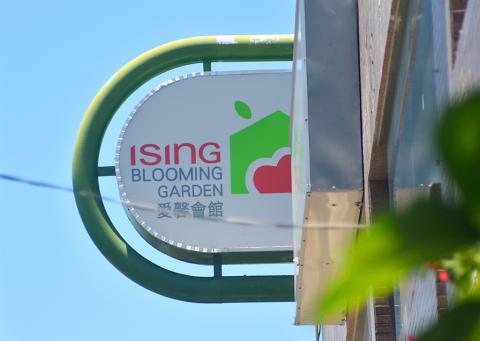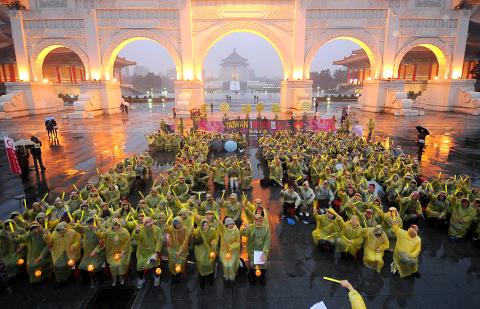In July last year the Director-General of the World Health Organization, Margaret Chan (陳馮富珍), issued a blunt statement: “Violence against women is a global health problem of epidemic proportions.”
Her bleak assessment, based on research spanning 27 years, indicates that 30 percent of women worldwide are affected by domestic or sexual violence by a partner, while more than 600 million women live in countries where domestic violence is not considered a crime.
However, while the treatment of women in some countries may demonstrate more brutally and publicly human rights violations, key research indicates that domestic violence in Taiwan is still a major — albeit largely hidden — menace.

Photo: Sam Sky Wild
HUMAN RIGHTS CHALLENGE
In fact, violence against women is so significant a factor in Taiwan that the US Human Rights Report (2012), a much-respected bi-annual US government review, listed it as being the gravest human rights challenge currently confronting Taiwanese society. Worryingly, on the issue of sexual violence, the report states: “Because victims were socially stigmatized, many did not report the crime, and the Ministry of Interior estimated that the total number of sexual assaults was 10 times the number reported to police.”
Research undertaken by the Garden of Hope Foundation, a non-government organization dedicated to assisting women who have been the victims of domestic violence, suggests that the problem is deeply ingrained. Last January it released the findings of a research drive indicating that 41.5 percent of women in Taiwan have fallen victim to violence.

Photo: Liao Chen-huei, Taipei Times
As part of its drive to combat domestic violence, the foundation, which operates a national network of facilities, provides social workers, counseling and — in Taitung City — a novel hotel-based project aimed at assisting women fleeing from abusive relationships.
REBUILDING LIVES
Located on the nondescript Zhongxing Road in Taitung City, the group’s 21-bed I-Sing Blooming Garden Hotel (愛馨會館) provides work for around a dozen women — single mothers, foreign spouses and Aboriginal women alike. The project aims to help equip them with some of the key skills they need as they prepare to re-build their lives, often with children in tow.
A-Chiao (阿嬌 , her name has been changed to protect her identity), a Vietnamese woman who had been married to a Taiwanese man and with whom she has a young daughter, now works at the hotel and explains that it helped her to escape an increasingly abusive relationship.
“He would curse us when he was unhappy and he also hit me,” she says, adding that her ex-husband drank a lot.
The mail-order bride, who has since divorced her husband, and who says she was at her “wit’s end” when she arrived at the hotel, described living in constant fear when she was at her marital home. A-Chiao twice tried to escape her oppressive circumstances but, unable to find work, she was forced to return to her husband both times.
A-Chiao is one of a growing number of foreign brides brought to Taiwan to marry Taiwanese men — the National Immigration Agency puts the current number at 320,000. In fact, says the government body, there are so many foreign brides that 10 percent of the country’s elementary school students are now from families with one foreign parent.
Amid such a major influx of women from overseas nations — principally Vietnam, Indonesia and China — there have been calls for changes to certain laws that limit their ability to fully participate in society.
Zhan Xiu-ying (湛秀英) who heads an immigrant rights group in Greater Kaohsiung, recently called on political parties to stop “seeing Chinese spouses from a political point of view … Chinese spouses are not enemies or people from an enemy country.”
The issue of foreign brides remains a contentious one and whether or not they are more likely to be abused by their partners remains largely unknown. However, women’s rights campaigners have recently unveiled a legislative drive which would widen the definition of spousal abuse to include the aggression of ex-partners as well as those not cohabiting. Currently, argue women’s rights advocates, the law does not adequately reflect — nor protect — the modern living patterns of many women.
Democratic Progressive Party (DPP) legislator Wu Yi-chen (吳宜臻), the woman who has ensured that updating the Domestic Violence Prevention Act (家庭暴力防治法) remains on the agenda at the Legislative Yuan, explains that domestic violence often goes unreported due to a local culture of keeping domestic affairs out of the public realm. She also argues that a widely-held misconception that “only abnormal, low-class and uneducated people are capable of beating up their wives” holds back the potential for a more honest and open discussion about widespread abuse that permeates every level of society.
“Many people say, ‘The law has no right entering a home’ and ‘what happens between a husband and his wife should start at the bottom and finish at the end of the bed,’” says Wu. “For this reason, ‘domestic violence’ is a ‘family matter’ which means any person not affiliated to the family has no right to interfere.”
INCREASING AWARENESS
Wu says that protecting the rights of women in abusive relationships calls for widespread — and deeper — government action. She urges a widening of measures to boost awareness of the issue, an increase in the mechanisms through which domestic violence can be reported and more support for victims including counseling and medical assistance. Wu remains convinced that ongoing pressure can assist in changing the culture.
“We can change the chain of factors that lead to an environment of domestic violence and prevent future cases from happening,” she says.
The reality that domestic violence compromises the lives of tens of thousands of Taiwanese women every year would appear to contradict the many strides that women have made in wider society. Currently 37 percent of the country’s women hold college degrees or higher — a figure in excess of the Organization for Economic Co-operation and Development countries’ average. Additionally, women own a third of Taiwan’s business enterprises, occupy key positions across a spectrum of professions and are active in the political arena.
However, for some commentators, including writer Shirley Chang (張林秀菊), Taiwan still operates as a male chauvinist culture.
“Women’s pay is roughly 75 percent of men,” Chang says. “In Taiwan men often think women are less capable … unfortunately women here are happy to get a job, and don’t fight for what they are entitled.”
Women’s rights groups argue that limited expectations for women are very much part of the problem, but groups, including the Garden of Hope Foundation, says that men are also often shackled by convention.
The “wrong concepts of masculinity” hold men back, says the foundation, and, because men have limited outlets to “show any … signs of emotional weakness … they resort to inappropriate anger and violent actions.”
IN HER SHOES
In a bid to arrest the problem the foundation has launched a campaign called V-Men in which participants are invited to “be in her shoes” — this novel, good-natured, approach includes men wearing high heels or prosthetic bellies and carrying babies in a bid to bolster empathy for their partners. As part of the therapy men are requested to replace criticism with compliments, to embrace their partner instead of beating them and to agree that good men do not buy sex.
In Taitung City tourists are continuing to visit the I-Sing Garden Hotel, including a recent group of South Koreans who booked in specifically to support the campaign which underpins the unique holiday destination.
For A-Chiao, the hotel was a genuine beacon of hope at a difficult time in her life. By enrolling in the cookery courses on offer at the hotel, she says her confidence got the boost it needed.
“I was able to work as a private cook for a couple who were doctors,” she says. By allowing her to gain a second source of income — in addition to the wages her job at the hotel brought — she has built herself and her daughter a solid foundation for a new life and that, she says, is key to escaping domestic servitude and aggression.
— Additional reporting by Jake Chung

Towering high above Taiwan’s capital city at 508 meters, Taipei 101 dominates the skyline. The earthquake-proof skyscraper of steel and glass has captured the imagination of professional rock climber Alex Honnold for more than a decade. Tomorrow morning, he will climb it in his signature free solo style — without ropes or protective equipment. And Netflix will broadcast it — live. The event’s announcement has drawn both excitement and trepidation, as well as some concerns over the ethical implications of attempting such a high-risk endeavor on live broadcast. Many have questioned Honnold’s desire to continues his free-solo climbs now that he’s a

As Taiwan’s second most populous city, Taichung looms large in the electoral map. Taiwanese political commentators describe it — along with neighboring Changhua County — as Taiwan’s “swing states” (搖擺州), which is a curious direct borrowing from American election terminology. In the early post-Martial Law era, Taichung was referred to as a “desert of democracy” because while the Democratic Progressive Party (DPP) was winning elections in the north and south, Taichung remained staunchly loyal to the Chinese Nationalist Party (KMT). That changed over time, but in both Changhua and Taichung, the DPP still suffers from a “one-term curse,” with the

Jan. 26 to Feb. 1 Nearly 90 years after it was last recorded, the Basay language was taught in a classroom for the first time in September last year. Over the following three months, students learned its sounds along with the customs and folktales of the Ketagalan people, who once spoke it across northern Taiwan. Although each Ketagalan settlement had its own language, Basay functioned as a common trade language. By the late 19th century, it had largely fallen out of daily use as speakers shifted to Hoklo (commonly known as Taiwanese), surviving only in fragments remembered by the elderly. In

Lines between cop and criminal get murky in Joe Carnahan’s The Rip, a crime thriller set across one foggy Miami night, starring Matt Damon and Ben Affleck. Damon and Affleck, of course, are so closely associated with Boston — most recently they produced the 2024 heist movie The Instigators there — that a detour to South Florida puts them, a little awkwardly, in an entirely different movie landscape. This is Miami Vice territory or Elmore Leonard Land, not Southie or The Town. In The Rip, they play Miami narcotics officers who come upon a cartel stash house that Lt. Dane Dumars (Damon)